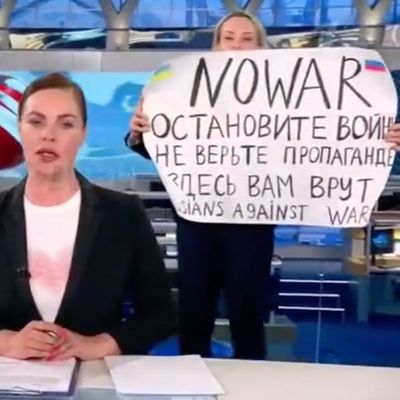
On Monday in Moscow, an employee of the popular state-owned television station Channel One charged onto its nightly news broadcast to protest Russia’s invasion of Ukraine. Marina Ovsyannikova, an editor for the network, appeared behind anchor Ekaterina Andreeva with a sign that read “NO WAR” in English. She told the audience that the state-controlled media was “lying to you” and called for an end to the war:
Before her protest, Ovsyannikova recorded a video condemning the invasion, saying that her father is Ukrainian and that she regrets contributing to the pro-war messages broadcast on Channel One. “Unfortunately, I’ve spent many of the last few years working for Channel One, doing Kremlin propaganda, and I’m deeply ashamed by this,” she said, concluding her speech by encouraging others to protest as well: “They can’t arrest us all.”
Ovsyannikova was detained by the police shortly after the protest. On Tuesday morning, her lawyers said they had been unable to find her after searching all night. Then a photo that showed Ovsyannikova in a Moscow court with attorney Anton Gashinsky began circulating online.
Following her release, Ovsyannikova told reporters that she had been questioned for more than 14 hours with no legal representation. She was fined 30,000 rouble (about $280) related to her video message, according to the BBC, and pleaded not guilt to a charge of organizing an unauthorized public event.
“It was my anti-war decision. I made this decision by myself because I don’t like Russia starting this invasion. It was really terrible,” she told a BBC journalist while exiting the courthouse.
It’s unclear if Ovsyannikova will face separate charges for her TV protest. Russian authorities have cracked down on both protesters and independent journalists since the invasion, and there are fears that Ovsyannikova could be prosecuted under a harsh new law that bans criticism of Russia’s military actions. On March 4, Russian president Vladimir Putin signed a law criminalizing demonstrations against the war and the broadcast of “fake news” about Ukraine, defined as information that is inconsistent with the official state narrative. Both actions could result in as many as 15 years in prison.
With independent media mostly off-line since the war began, the information from Ukraine broadcast on state-sponsored television has cast the invasion as a limited military operation, avoided images of destruction caused by Russian forces, and downplayed Russian casualties.
This post has been updated.





























